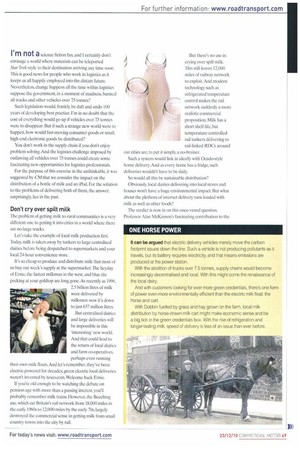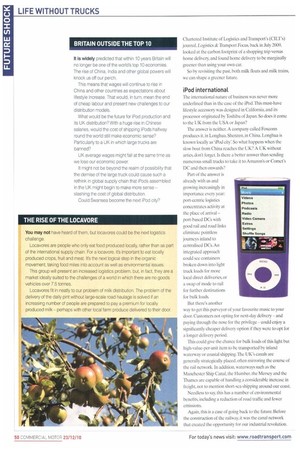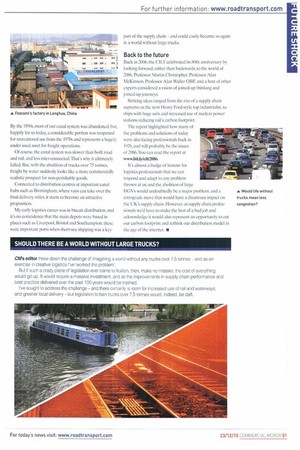I'm not a science fiction fan, and I certainly don't
Page 49

Page 50

Page 51

If you've noticed an error in this article please click here to report it so we can fix it.
envisage a world where materials can be teleported Star Trek-style to their destination arriving any time soon. This is good news for people who work in logistics as it keeps us all happily employed into the distant future. Nevertheless, change happens all the time within logistics: suppose the government, in a moment of madness, banned all trucks and other vehicles over 75 tonnes?
Such legislation would, frankly, be daft and undo 100 years of developing best practice. I'm in no doubt that the cost of everything would go up if vehicles over 7.5 tonnes were to disappear. But if such a strange new world were to happen, how would fast-moving consumer goods or small, high-end electronic goods be distributed?
You don't work in the supply chain if you don't enjoy problem solving. And the logistics challenge imposed by outlawing all vehicles over 75 tonnes could create some fascinating new opportunities for logistics professionals.
For the purpose of this exercise in the unthinkable, it was suggested by CM that we consider the impact on the distribution of a bottle of milk and an iPod. For the solution to the problems of delivering both of them, the answer, surprisingly, lies in the past.
Don't cry over spilt milk
The problem of getting milk to rural communities is a very different one to getting it into cities in a world where there are no large trucks.
Let's take the example of local milk production first. Today. milk is taken away by tankers to large centralised dairies before being despatched to supermarkets and your local 24-hour convenience store.
It's so cheap to produce and distribute milk that most of us buy our week's supply at the supermarket.lbe heyday of Ernie, the fastest milkman in the west, and blue tits pecking at your goldtop are long gone. As recently as 1996, 2.5 billion litres of milk were delivered by milkmen: now it's down to just 637 million litres.
But centralised dairies and large deliveries will be impossible in this 'interesting' new world. And that could lead to the return of local dairies and farm co-operatives. perhaps even running their own milk floats. And let's remember, they've been electric-powered for decades; green electric local deliveries weren't invented by tesco.com.Welcome back Ernie.
If you're old enough to be watching the debate on pension age with more than a passing interest, you'll probably remember milk trains. However, the Beech ing axe, which cut Britain's rail network from 18,000 miles in the early 1960s to 12,000 miles by the early 70s, largely destroyed the commercial sense in getting milk from small country towns into the city by rail. But there's no use in crying over spilt milk. 'This still leaves 12,000 miles of railway network to exploit. And modern technology such as refrigerated temperature control makes the rail network suddenly a more realistic commercial proposition. Milk has a short shelf-life, but temperature-controlled rail tankers delivering to rail-linked RDCs around our cities are, to put it simply, a no-brainer.
Such a system would link in ideally with Ocado-style home delivery. And as every home has a fridge, such deliveries wouldn't have to be daily.
So would all this be sustainable distribution?
Obviously, local dairies delivering into local stores and houses won't have a huge environmental impact. But what about the plethora of internet delivery vans loaded with milk as well as other foods?
The verdict is now in on this once-vexed question. Professor Alan McKinnon's fascinating contribution to the
BRITAIN OUTSIDE THE TOP 10
It is widely predicted that within 10 years Britain will no longer be one of the world's top 10 economies. The rise of China, India and other global powers will knock us oft our perch.
This means that wages will continue to rise in China and other countries as expectations about lifestyle increase. That would, in turn, mean the end of cheap labour and present new challenges to our distribution models.
What would be the future for iPod production and its UK distribution? With a huge rise in Chinese salaries, would the cost of shipping iPads halfway round the world still make economic sense? Particularly to a UK in which large trucks are banned?
UK average wages might fall at the same time as we lose our economic power.
It might not be beyond the realm of possibility that the demise of the large truck could cause such a rethink in global supply chain that 'Pods assembled in the UK might begin to make more sense — slashing the cost of global distribution.
Could Swansea become the next iPod city? Chartered Institute of Logistics and Transport's (CID's) journal, Logistics & Transport Focus, back in July 2009. looked at the carbon footprint of a shopping trip versus home delivery, and found home delivery to be marginally greener than using your own car.
So by revisiting the past. both milk floats and milk trains, we can shape a greener future.
iPod international
The international nature of business was never more underlined than in the case of the iPod. This must-have lifestyle accessory was designed in California, and its processor originated by Toshiba of Japan. So does it come to the UK from the USA or Japan?
The answer is neither. A company called Foxconn produces it, in Longhua. Shenzen, in China. Longhua is known locally as 'iPod city'. So what happens when the slow boat from China reaches the UK? A UK without artics, don't forget. Is there a better answer than sending numerous small trucks to take it to Amazon's or Comet's DC and then onwards?
Part of the answer is already with us and growing increasingly in importance every year port-centric logistics concentrates activity at the place of arrival — port-based DCs with good rail and road links eliminate pointless journeys inland to centralised DCs. An integrated approach could see containers broken down into light truck loads for more local direct deliveries, or a swap of mode to rail for further destinations for bulk loads.
But there's another way to get this purveyor of your favourite music to your door. Customers not opting for next-day delivery — and paying through the nose for the privilege — could enjoy a significantly cheaper delivery option if they were to opt for a longer delivery period.
This could give the chance for bulk loads of this light but high-value-per-unit item to be transported by inland waterway or coastal shipping. The UK's canals are generally strategically placed, often mirroring the course of the rail network. In addition, waterways such as the Manchester Ship Canal, the Humber, the Mersey and the Thames are capable of handling a considerable increase in freight, not to mention short-sea shipping around our coast.
Needless to say, this has a number of environmental benefits, including a reduction of road traffic and fewer emissions.
Again, this is a case of going back to the future. Before the construction of the railway. it was the canal network that created the opportunity for our industrial revolution. By the 1950s, most of our canal system was abandoned, hut, happily for us today. a considerable portion was reopened for recreational use from the 1970s and represents a hugely under used asset for freight operations Of course, the canal system was slower than both road and rail, and less inter-connected. That's why it ultimately failed. But, with the abolition of trucks over 7.5 tonnes, freight by water suddenly looks like a more commercially realistic prospect for non-perishable goods.
Connected to distribution centres at important canal hubs such as Birmingham, where vans can take over the final delivery miles, it starts to become an attractive proposition.
My early logistics career was in biscuit distribution, and it's no coincidence that the main depots were based in places such as Liverpool. Bristol and Southampton: these were important ports when shod-sea shipping was a key part of the supply chain — and could easily become so again in a world without large trucks
Back to the future
Back in 2006, the CILT celebrated its 80th anniversary by looking forward, rather than backwards, to the world of 2086. Professor Martin Christopher, Professor Alan McKinnon. Professor Alan Waller OBE and a host of other experts considered a vision of joined-up thinking and joined-up journeys.
Striking ideas ranged from the rise of a supply chain supremo as the next Henn' Ford-style top industrialist, to ships with huge sails and increased use of nuclear power stations reducing rail's carbon footprint.
The report highlighted how many of the problems and solutions of today were also facing professionals back in 1926, and will probably be the issues of 2086. You can read the report at www.biLlykitt2086.
It's almost a badge of honour for logistics professionals that we can respond and adapt to any problem thrown at us; and the abolition of large HC.1Vs would undoubtedly be a major problem, and a retrograde move that would have a disastrous impact on the UK's supply chain. However, as supply chain professionals we'd have to make the best of a bad job and acknowledge it would also represent an opportunity to cut our carbon footprint and rethink our distribution model in the age of the internet. •
SHOULD THERE BE A WORLD WITHOUT LARGE TRUCKS?
CM's editor threw down the challenge of imagining a world without any trucks over 7.5 tonnes and as an exercise in creative logistics I've 'worked the problem'.
But if such a crazy piece of legislation ever came to fruition, then, make no mistake, the cost of everything would go up. It would require a massive investment, and all the improvements in supply chain performance and best practice delivered over the past 100 years would be trashed.
I've sought to address the challenge — and there certainly is room for increased use of rail and waterways, and greener local delivery but legislation to ban trucks over 7.5 tonnes would, indeed, be daft.
































































































































